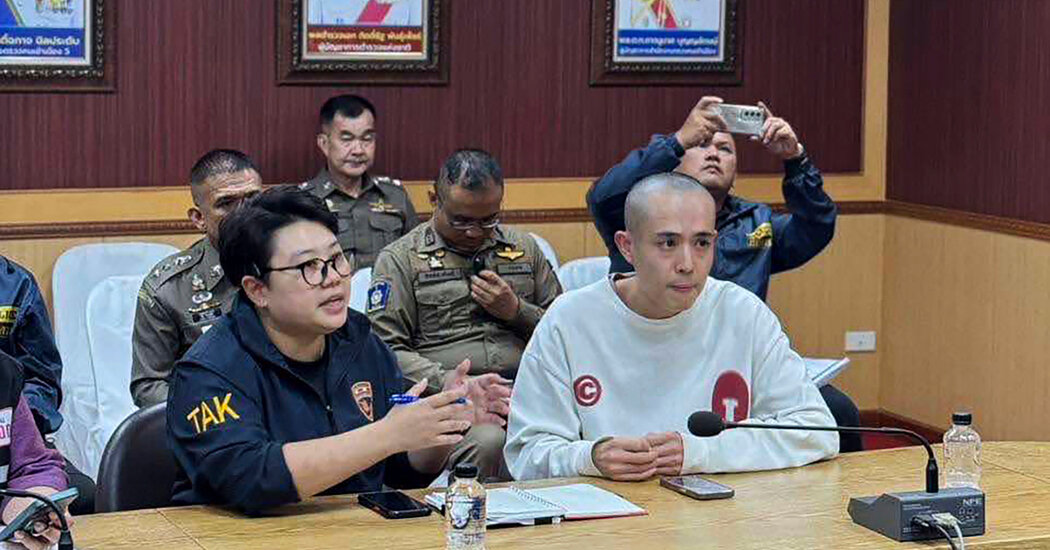Chartered flights have been canceled. Performances have been canceled or postponed. Travel agencies have responded to requests from travelers wishing to change their plans.
Chinese travelers have abandoned trips to Thailand, frightened by the story of a Chinese actor who was kidnapped there, taken to Myanmar and forced to work in an online scam complex. The incident is a blow to Thailand’s tourism sector ahead of the Lunar New Year holiday at the end of this month, when many Chinese were expected to visit.
The disappearance of actor Wang Xing from the Thai border town of Mae Sot this month has stoked public concerns about security in Thailand. Mr Wang was later rescued from a scam resort in Myanmar, but many travelers and event organizers were already shaken.
Eason Chan, a Hong Kong pop star, has canceled a sold-out concert planned for next month at Impact Arena in Bangkok, with organizers citing “security concerns for Chinese citizens and fans from around the world traveling to Thailand “. Zhao Benshan, a Chinese comedian known for his sketches during the Chinese state broadcaster’s Lunar New Year gala, also postponed his visit to Bangkok next month.
Nuntaporn Komonsittivate, an executive at low-cost carrier Thai Lion Air, said Wednesday that 20 percent of the company’s charter flights between China and Thailand – serving routes to Chinese cities other than the six cities in which the company airline usually operates – have been canceled.
On Weibo, a Chinese social network, people discussed travel refunds and Thailand’s safety, using hashtags that gained popularity on the platform. Travel agents in China said they have received requests from travelers wanting to cancel their trip to Thailand or change their destination.
Zhang Zhihong, a sales representative for Baochunguo Travel Agency, a company based in the southern city of Shenzhen that specializes in Southeast Asian travel, said a quarter of the trips to Thailand his company operated were canceled last week. last. “This was all due to public opinion surrounding this incident. People thought traveling to Thailand was unsafe and demanded a refund.
This anxiety could complicate Thailand’s efforts to revitalize its tourism sector after the pandemic. Thailand has relaxed visa requirements for Chinese travelers and offered discounts on Chinese travel platforms as part of a campaign the country has dubbed “Nihao Month”, using the Mandarin term for “hello”. Nearly 7 million Chinese visited Thailand in 2024, making it the largest group of international visitors.
The public outcry over Mr Wang’s kidnapping is increasing pressure on the Thai and Chinese governments to do more to prevent Chinese people from being kidnapped and trafficked to fraudulent compounds in Myanmar.
“The cancellation of performances and public attention could force Thai authorities to tackle human trafficking and scams more seriously,” said Ja Ian Chong, associate professor of political science at the National University of Thailand. Singapore.
Hundreds of thousands people, often attracted by offers of well-paid jobs, have been trapped by such cybercrime operations in Myanmar and Cambodia and forced to participate in sophisticated scams to defraud people online. Many captives first land in Thailand before smuggling across the porous border into lawless areas mainly controlled by Chinese organized crime syndicates.
Thai police said Mr. Wang had traveled to Bangkok for what he thought was a casting opportunity. After he disappeared on January 3, his girlfriend filed a report with Chinese police and the embassy in Thailand. She appealed for help on social media and her messages, shared by Chinese celebrities, were widely circulated.
On January 7, Thai authorities said Mr. Wang had been found and rescued, but they did not provide details. Criminal gangs often demand hefty ransoms to free their captives from these compounds.
Mr. Wang, in video interviews with Thai media after his release, said he was forced to shave his head and learn to type quickly.
Thai authorities sought to use his rescue to reassure Chinese travelers about visiting Thailand. In one video, a Thai police officer urged Mr. Wang: “You think Thailand is safe for you. Can you say in Chinese? »
Mr. Wang’s quick rescue sparked a wave of calls for help from the families of other Chinese victims, some of whom have been missing in Southeast Asia for months or years. A diary containing details of the disappearance of more than 170 other Chinese victims has been widely shared on Weibo.
Thai authorities have been quick to show that they are working to protect the safety of visitors. Thai police met with Chinese diplomats to discuss establishing a center for coordinate efforts to find missing people and exchange information. And on Monday, Thai authorities said two Chinese women kidnapped in Thailand had been rescued by Chinese authorities and repatriated.
Thienprasit Chaiyapatranun, president of the Thai Hotel Association, said he hoped the Thai government would do more to ease Chinese tourists’ concerns.
“We are concerned that this will have long-term effects,” he said.
Siyi Zhao contributed to the research.






